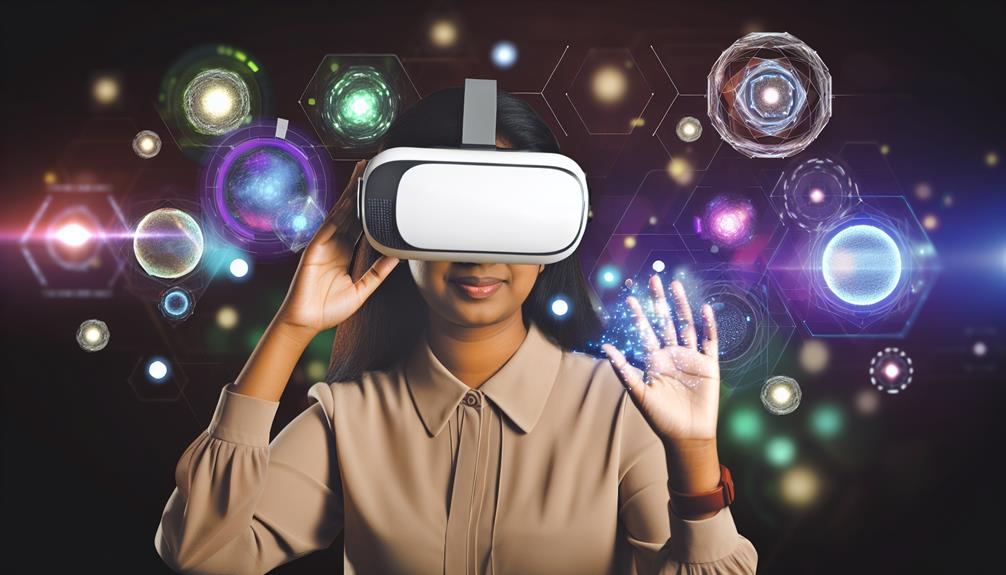In a world saturated with technological advancements, the question of who holds the title of the number one tech in the world remains a topic of fervent debate. From the ubiquitous presence of smartphones shaping our daily interactions to the complexities of artificial intelligence pushing the boundaries of human capabilities, each innovation vies for the top spot.
The rise of virtual reality, the revolution in robotics, and the promising future of quantum computing all contribute to the intrigue surrounding this question. As we navigate through this landscape of cutting-edge technologies, the answer to who truly reigns supreme in the tech realm continues to elude us, leaving us pondering the possibilities that lie ahead.
Key Takeaways
- Smartphones have evolved into powerful pocket computers essential for personal and professional use.
- AI's disruptive impact on various industries necessitates navigating ethics to maximize its potential.
- VR revolutionizes experiences in gaming, business, education, and healthcare sectors.
- Robotics and automation advancements enhance efficiency, safety, and cost savings in industries.
Evolution of Smartphones

Throughout the past few decades, smartphones have undergone a remarkable evolution, transforming from basic communication devices to multifunctional pocket-sized computers that have revolutionized the way we live and work. Smartphone innovation has been at the forefront of technological advancements, driving changes in mobile communication trends.
The evolution of smartphones can be attributed to rapid advancements in hardware and software technologies. From the introduction of touchscreens to the integration of high-resolution cameras, GPS capabilities, and powerful processors, smartphones have become indispensable tools for personal and professional use. These innovations have not only enhanced communication but have also enabled users to access a wide range of services and applications on the go.
Moreover, mobile communication trends have shifted towards increased connectivity and mobility. With the rise of social media platforms, messaging apps, and video conferencing tools, smartphones have become primary devices for staying connected with others. The convenience of accessing emails, browsing the internet, and managing daily tasks from a single device has significantly impacted how people interact and conduct business in today's fast-paced world.
Rise of Artificial Intelligence
The proliferation of artificial intelligence (AI) technologies has significantly reshaped various industries and sectors worldwide. AI, driven by machine learning algorithms, has brought about unprecedented advancements and transformations. Here are some key points to consider:
- AI Ethics: The ethical considerations surrounding AI have become a focal point of discussion. Issues such as bias in algorithms, data privacy, and the potential impact on employment have raised important questions about the responsible development and deployment of AI technologies.
- Machine Learning Algorithms: The core of AI innovation lies in machine learning algorithms. These algorithms enable systems to learn from data, identify patterns, and make decisions with minimal human intervention. As these algorithms continue to evolve, their applications across industries are expanding rapidly.
- Industry Disruption: AI has disrupted traditional business models across various sectors, including healthcare, finance, and transportation. Companies are increasingly leveraging AI to drive efficiency, enhance customer experiences, and gain a competitive edge in the market.
- Future Implications: The rise of AI is poised to have profound implications for society as a whole. As AI technologies become more sophisticated, discussions around job displacement, societal impact, and the need for regulatory frameworks will become increasingly important.
As AI continues to advance, navigating the complexities of AI ethics and maximizing the potential of machine learning algorithms will be critical for harnessing the full benefits of this transformative technology.
Impact of Virtual Reality

Virtual reality technology has rapidly emerged as a transformative tool across a myriad of industries and sectors globally. This innovative technology allows individuals to experience immersive digital environments, creating a sense of presence in a virtual world. The impact of virtual reality can be seen in various fields, ranging from entertainment and education to healthcare and business.
One of the key aspects of virtual reality is its ability to provide users with immersive experiences that simulate real-world scenarios. This immersion enables users to interact with digital environments in a way that feels authentic and engaging. For example, virtual reality has revolutionized the gaming industry by allowing players to step into virtual worlds and experience games in a whole new dimension.
Moreover, virtual reality has also made significant strides in enhancing digital presence for businesses. Companies are utilizing virtual reality technology to create virtual showrooms, conduct virtual meetings, and offer virtual tours of their products or services. This has not only expanded their reach to a global audience but has also improved customer engagement and satisfaction.
Revolution in Robotics
The advancements in virtual reality technology have laid a strong foundation for the ongoing revolution in robotics, reshaping industries and pushing the boundaries of automation and artificial intelligence integration. This transformation is characterized by:
- Enhanced Efficiency: Automation advancements in robotics have significantly boosted efficiency in various sectors, streamlining processes and reducing human error.
- Increased Precision: Robotics innovation has led to the development of highly precise machines capable of performing complex tasks with accuracy, revolutionizing industries such as manufacturing and healthcare.
- Cost Savings: The integration of automation technologies in robotics has resulted in cost savings for businesses, as tasks can be performed faster and with fewer resources.
- Improved Safety: Robotics advancements have enhanced workplace safety by delegating dangerous tasks to robots, reducing the risk of accidents and injuries for human workers.
The synergy between automation advancements and robotics innovation is driving a paradigm shift in how tasks are accomplished across diverse industries. As these technologies continue to evolve, the potential for further optimization and customization in robotics holds promise for even greater efficiency and effectiveness in the future.
Future of Quantum Computing

Advancements in quantum computing technology are poised to revolutionize the landscape of computational power and problem-solving capabilities. Quantum computing harnesses the principles of quantum mechanics to process information in ways that traditional computers cannot replicate. One of the most anticipated milestones in quantum computing is achieving quantum supremacy, which refers to the point where a quantum computer can outperform the most powerful supercomputers in solving a specific problem. This breakthrough would mark a significant leap forward in computational capabilities, opening doors to solving complex problems in various fields such as drug discovery, materials science, and optimization.
Quantum encryption is another critical aspect of the future of quantum computing. Quantum encryption leverages the unique properties of quantum mechanics to create unhackable communication channels. By using quantum key distribution, which relies on the principles of quantum entanglement, quantum encryption ensures that any attempt to intercept or eavesdrop on communication would disrupt the quantum state, alerting both parties to a security breach. As cybersecurity threats continue to evolve, the development of quantum encryption offers a promising solution to safeguard sensitive information in an increasingly interconnected world.
Frequently Asked Questions
What Are the Most Common Security Threats Faced by the Top Tech Companies in the World?
When examining the security landscape of top tech companies, prevalent threats include cyber attacks, data breaches, phishing scams, and ransomware attacks.
These organizations are prime targets for malicious actors seeking to exploit vulnerabilities for financial gain or to disrupt operations.
Implementing robust cybersecurity measures, regular security assessments, employee training, and staying abreast of emerging threats are essential to safeguarding sensitive data and maintaining business continuity in the face of evolving security challenges.
How Do Major Tech Companies Approach Ethical Considerations in Their Development of New Technologies?
In the realm of major tech companies, addressing ethical considerations in the development of new technologies has become a paramount concern. With the rise of AI ethics and the prevalence of algorithm bias, companies are under scrutiny to ensure fairness and transparency in their products.
Additionally, navigating privacy regulations and the responsible use of surveillance technology adds another layer of complexity. Striving for ethical excellence has now become a core component of tech innovation.
What Are the Current Trends in Tech Industry Mergers and Acquisitions?
Industry consolidation is a prevalent trend in the tech sector, driven by the need for market competition and strategic partnerships. Companies are increasingly looking to expand their innovation ecosystems through mergers and acquisitions.
This trend is reshaping the competitive landscape, with larger entities gaining more influence and resources. As tech firms seek to stay ahead in the rapidly evolving industry, these strategic moves play a crucial role in shaping their future growth and success.
How Do Tech Giants Address Concerns About Data Privacy and Protection?
Navigating the complex landscape of data privacy and protection, tech giants employ various strategies. Data encryption safeguards information, while obtaining user consent ensures transparency.
Addressing concerns involves adhering to government regulation and upholding corporate responsibility. Striking a balance between innovation and privacy, tech giants are challenged to prioritize user trust.
As the digital realm evolves, the idiom 'actions speak louder than words' rings true in the tech industry's approach to data security.
What Are Some of the Lesser-Known Advancements Being Made in the Field of Biotechnology by Tech Companies?
Advancements in biotechnology by tech companies encompass gene editing for improving agriculture and utilizing stem cells for enhancing healthcare. Companies are exploring innovative solutions in crop modification and disease treatment.
Less publicized breakthroughs include precision gene editing tools and personalized medicine advancements. These developments hold promise for revolutionizing various industries and addressing critical global challenges related to food security and healthcare delivery.
Conclusion
In conclusion, the world of technology has seen significant advancements in recent years. From the evolution of smartphones to the rise of artificial intelligence, impact of virtual reality, and revolution in robotics. The future of technology is promising, with the potential of quantum computing leading the way.
Like a puzzle coming together, these innovations are shaping the world we live in, connecting us in ways we never thought possible.

